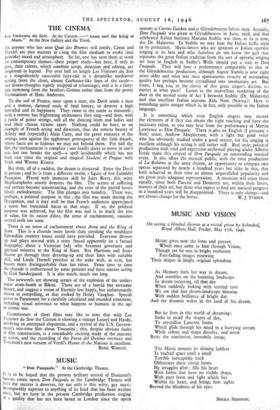THE CINEMA
Lea Visiteurs du Soir. At the Curzon.—" Anna and the King of Siam." At the New Gallery and the Tivoli.
As anyone who has seen Quai des Brumes will testify, Came and Prevert are past masters at ising the film medium to evoke (and provoke) mood and atmosphere. So far, one has Seen them at work on contemporary themes—their proper study—but here' if only in part, their talents, which combine script, direction and editing, are employed in legend. For over half its length Les Visiteurs du Soir is a magnificently successful fairy-tale in a dreamlike mediaeval setting (note the clean almost Corbusier-like lines of the castle— our dream-thoughts rightly stripped of trimmings), and it is a fairy- tale stemming from the brothers Grimm rather than from the pretty Victorianism of Hans Andersen.
To the soil of France, once upon a time, the Devil sends a man and a woman, damned souls of fatal beauty, to destroy a high betroihal and its happiness. They come to the castle as minstrels ; with a remote but frightening seriousness they sing—and then, with a rustle of guitar strings, still all the dancing lords and ladies and lead their chosen victims apart. Nothing could be finer, as an
example of French acting and direction, than the remote beauty of Arletty and (especially) Main Cuny, and the grave romance of the settings seen against the qightmare grotesquerie of the little dwarfs, whose faces are so hideous we may not behold them. For half the film the enchantment is complete ; one hardly dares to move in one's seat lest one breaks the spell—a spell incidentally which has not been cast since the original and magical Student of Prague with Veidt and Werner Krauss.
But then, all of a sudden, the dream is shattered. Enter the Devil in person ; and he is from a different world, a figure of low Comedic Francaise. Played with immense skill by Jules Berry, this witty Mephistopheles utterly destroys the film. The scenes of suffering and torture become unconvincing, and the cries of the parted lovers falsely melodramatic. The film plunges into banality. There was, perhaps, a political purpose in this ; the film was made during the Occupation, and it may well be that French audiences appreciated a suave but frustrated Satan at that stage. If so, the political. purpose was achieved, but the fihn was and is so much the less of value, for its raison d'être, the sense of enchantment, vanishes several reels too soon.
There is no sense of enchantment about Anna and the King of Siam. This is a charade more lavish than anything the wealthiest Edwardian country house could have provided. Everyone dresses up and plays around with a story (based apparently on a factual biography) about a Victorian lady who becomes governess and spiritual mistress to the King of Siam. Rex Harrison and Irene Dunne go through their dressing-up and their lines with suitable skill, and Linda Darnell perishes at the stake with, as ever, her bosom more distinguishable than her talent. From time to time the charade is embarrassed by some genuine and most sincere .acting by Gail Sondergaard. It is also much, much too long.
The newsreels are showing scenes of the explosion of the under- water atom-bomb at Bikini. These are of a horrid but awesome beauty, and suggest a vision of Eternity less happy, but unfortunately almost as compelling, as that evoked by Henry Vaughan. Special praise to Paramount for a carefully calculated and rounded treatment, including visual reference to what happens to humans in the age of atomic war.
Connoisseurs of short films may like to note that with Les Visiteurs du Soir the Curzon is showing a vintage Laurel and Hardy, involving an attempted elopement, and a revival of the U.S. Govern- ment's war-time film about Toscanini ; this, despite obvious faults of film construction, is a remarkably exciting study of the maestro in action, and the recording of the Forza del Destirto overture and Toscanini's new version of Verdi's Hymn of the Nations is excellent.
BASIL WRIGHT.


























 Previous page
Previous page